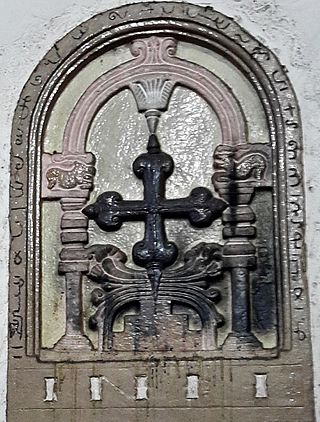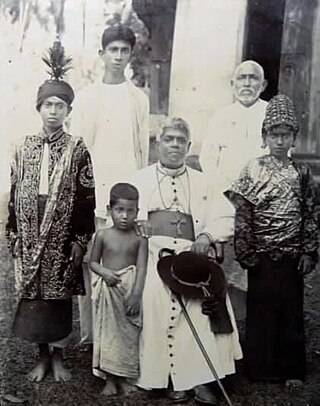
The Syriac Orthodox Church, also known as West Syriac Church or West Syrian Church, officially known as the Syriac Orthodox Patriarchate of Antioch and All the East, and informally as the Jacobite Church, is an Oriental Orthodox church that branched from the Church of Antioch. The bishop of Antioch, known as the patriarch, heads the church and possesses apostolic succession through Saint Peter, according to sacred tradition. The church upholds Miaphysite doctrine in Christology, and employs the Divine Liturgy of Saint James, associated with James, the brother of Jesus. Classical Syriac is the official and liturgical language of the church.

The Saint Thomas Christians, also called Syrian Christians of India, Marthoma Suriyani Nasrani, Malankara Nasrani, or Nasrani Mappila, are an ethno-religious community of Indian Christians in the state of Kerala, who, for the most part, employ the Eastern and Western liturgical rites of Syriac Christianity. They trace their origins to the evangelistic activity of Thomas the Apostle in the 1st century. The Saint Thomas Christians had been historically a part of the hierarchy of the Church of the East but are now divided into several different Eastern Catholic, Oriental Orthodox, Protestant, and independent bodies, each with their own liturgies and traditions. They are Malayalis and speak Malayalam. Nasrani or Nazarene is a Syriac term for Christians, who were among the first converts to Christianity in the Near East.

The Syro-Malabar Catholic Church, is an Eastern Catholic Church based in Kerala, India. It is sui iuris (autonomous) particular Church in full communion with the Pope and the worldwide Catholic Church, including the Latin Church and the 22 other Eastern Catholic Churches, with self-governance under the Code of Canons of the Eastern Churches (CCEO). The Church is headed by the Major Archbishop of the Syro-Malabar, currently George Alencherry. The Syro-Malabar Synod of Bishops canonically convoked and presided over by the Major Archbishop constitutes the supreme authority of the Church. The Major Archiepiscopal Curia of the Church is based in Kakkanad, Kochi. Syro-Malabar is a prefix reflecting the church's use of the East Syriac Rite liturgy and origins in Malabar. The name has been in usage in official Vatican documents since the nineteenth century.

The Malankara Mar Thoma Syrian Church, often shortened to Mar Thoma Church, and known also as the Reformed Syrian Church and the Mar Thoma Syrian Church of Malabar, is an autonomous Eastern Protestant Christian church based in Kerala, India. While continuing many of the Syriac high church practices, the church is Protestant in its theology and doctrines. It employs a reformed variant of the West Syriac Rite Divine Liturgy of Saint James, translated to Malayalam.

Syriac Christianity is a branch of Eastern Christianity whose formative theological writings and traditional liturgies are expressed in the Classical Syriac language, a variation of the old Aramaic language. In a wider sense, the term can also refer to Aramaic Christianity in general, thus encompassing all Christian traditions that are based on liturgical uses of Aramaic language and its variations, both historical and modern.

The K'nānāya, also known as the Southists or Tekkumbhagar, are an endogamous ethnic group found among the Saint Thomas Christian community of Kerala, India. They are differentiated from another part of the community, known in this context as the Northists (Vaddakkumbhagar). There are about 300,000 Knanaya in India and elsewhere.

The Synod of Diamper (Udayamperoor Synod) (Malayalam: ഉദയംപേരൂർ സൂനഹദോസ്, romanized: Udayampērūṟ Sūnahadōs), held at Udayamperoor (known as Diamper in non-vernacular sources) in June 1599, was a diocesan synod, or council, that created rules and regulations for the ancient Saint Thomas Christians (also known as Mar Thoma Nasranis) of the Malabar Coast, a part of modern-day Kerala state, India, formally subjugating them and downgrading their whole Metropolitanate of India as the Diocese of Angamale, a suffragan see to the Archdiocese of Goa administered by Latin Church Padroado missionaries. This synod also introduced forced Liturgical Latinisation and the eschewal of local practices and beliefs, leading to a significant ecclesial protest by Saint Thomas Christians known as Coonan Cross Oath and a subsequent schism in the mid-17th century.
Varghese, Varughese, Verghese, Geevarghese, Varughis, and Varkey are Syriac–Malayalam variants of the Assyrian Syriac/Aramaic Christian name Giwargis/Gewargis/Givargis (George) in India. The pronunciation from Syriac/Aramaic was naturally adapted to fit the vowels of the local dialect. It is given as first, middle or last name among the Syrian Christians. Many names of this community are a combination of Hebrew and Aramaic names that have been adapted into the local dialect.

Kuriakose Elias Chavara, CMI was an Indian Syro-Malabar Catholic priest, religious, philosopher and social reformer. He is the first canonised Catholic male saint of Indian origin and a member of the Syro-Malabar Church, an Eastern Catholic church. He was the co-founder and first Prior General of the first congregation for men in the Syro-Malabar Church, now known as the Carmelites of Mary Immaculate (CMI), and of a similar one for women, the Congregation of the Mother of Carmel (CMC). He was a pioneer in many fields.

Cyricus, and his mother, Julitta are venerated as early Christian martyrs. According to tradition, they were put to death at Tarsus in AD 304.
Mar, also Mor in Western Syriac has the literal meaning "milord", it is a title of reverence in Syriac Christianity. The corresponding feminine forms are Morth and Marth for "milady". The title is placed before the Christian name, as in Mar Aprem/ Mor Afrem and Marth/ Morth Maryam for St Mary. It is given to all saints in Eastern Christianity and is also used in instead of "Most Reverend", just before the name in religion taken by bishops. The title of Moran Mor/ Maran Mar is given to the Catholicoi and other primates; and the title Mar/ Mor is given to prelates such as metropolitan bishops or archbishops.

The Malabar Independent Syrian Church (MISC) also known as the Thozhiyur Church, is a Christian church centred in Kerala, India. It is one of the churches of the Saint Thomas Christian community, which traces its origins to the evangelical activity of Thomas the Apostle in the 1st century.
Cyriacus is a given name of Greek origin. The Greek Κυριακός (Kyriakos) means "belonging to the lord". It has strong Christian connotations and is one of the most common names found in Christian inscriptions from ancient Rome. The Latin Dominicus has the same meaning and may originate as a translation of the Greek name.

The Jacobite Syrian Christian Church (JSCC), or the Malankara Archdiocese of the Syriac Orthodox Church in India the Jacobite Syrian Church, and the Syriac Orthodox Church in India, is a catholicate based in Kerala, India, of the Syriac Orthodox Church of Antioch and part of the Oriental Orthodox Church. It recognizes the Syriac Orthodox Patriarch of Antioch and All the East as supreme head of the church. It functions autonomously within the church, administered by the Metropolitan Trustee, under the authority of the Maphrian of India, Baselios Thomas I. Following schism with the Malankara Orthodox Syrian Church, is currently the only church in Malankara that is under Syriac Orthodox Church. The church employs the West Syriac Rite Liturgy of Saint James.

The Malankara Church, also known as Puthenkur, is the historic unified body of West Syriac Saint Thomas Christian denominations which claim ultimate origins from the missions of Thomas the Apostle. This community, under the leadership of Thoma I, opposed the Padroado Jesuits as well as the Propaganda Carmelites of the Latin Church, following the historical Coonan Cross Oath of 1653. The Malankara Church's divisions and branchings have resulted in the modern-day Churches that include the Jacobite Syrian Christian Church, the Malankara Orthodox Syrian Church, the Malankara Mar Thoma Syrian Church, the Malabar Independent Syrian Church, the Syro-Malankara Catholic Church and the Saint Thomas Anglicans of the Church of South India.
Kuriakose is a common male first name and surname among Saint Thomas Christians, mainly from central part of the state of Kerala in India and surrounding areas. Derivatives of the name Kuriakose include Kurian and Kurien. This name is a variant of names found among Middle Eastern countries among the minority Syrian, Iranian and Iraqi Christians such as Assyrians and Arabs, Kyriakos in Greece and Cyprus, Cyriacus in Italy and Cyr in France.
Cherian/Cheriyan is a Syrian Christian surname of West Asian (Hebrew-Aramaic) origin, presumed to be a derivative of Zecharya and a variant of Zacharias popular among the Christian community of Kerala, southern India. The final -n is the Malayalam third-person masculine singular suffix.

Several historical evidences shed light on a significant Malankara–Persian ecclesiastical relationship that spanned centuries. While an ecclesiastical relationship existed between the Saint Thomas Christians of India and the Church in Sassanid Empire in the earlier centuries, closer ecclesiastical ties developed as early as seventh century, when India became an ecclesiastical province of the Church of the East, albeit restricted to matters of purely ecclesiastical nature such as ordination of priests, and not involved in matters of temporal administration. This relationship endured until the Portuguese protectorate of Cochin of Malabar came to be in 16th century, and the Portuguese discovery of a sea route to India. The Christians who came under the two ancient yet distinct lineages of Malankara and Persia had one factor in common: their Saint Thomas heritage. The Church of the East shared communion with the Great Church until the Council of Ephesus in the 5th century, separating primarily over differences in Christology.
Malankara Malpan Arch Corepiscopa Curien (Kurian) Kaniyamparambil was a priest in the Jacobite Syrian Christian Church and a scholar in Syriac language, who translated the Bible (വിശുദ്ധഗ്രന്ഥം) from ancient Peshitta text to Malayalam. This is the official bible used by Syriac Orthodox Church in India.








